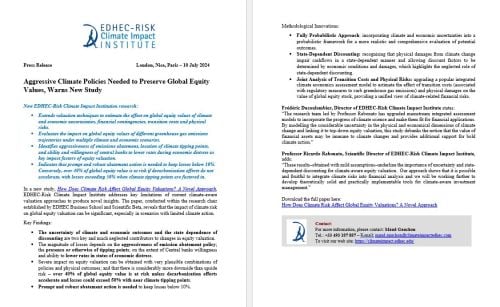
Aggressive Climate Policies Needed to Preserve Global Equity Values, Warns New Study
Written on 18 Jul 2024.

EDHEC-Risk Climate Impact Institute newly released research:
Extends valuation techniques to estimate the effect on global equity values of climate and economic uncertainties, financial contingencies, transition costs and physical risks.
Evaluates the impact on global equity values of different greenhouse gas emissions trajectories under multiple climate and economic scenarios.
Identifies aggressiveness of emissions abatement, location of climate tipping points, and ability and willingness of central banks to lower rates during economic distress as key impact factors of equity valuation.
Indicates that prompt and robust abatement action is needed to keep losses below 10%. Conversely, over 40% of global equity value is at risk if decarbonisation efforts do not accelerate, with losses exceeding 50% when climate tipping points are factored in.
In a new study, "How Does Climate Risk Affect Global Equity Valuations? A Novel Approach", EDHEC-Risk Climate Impact Institute addresses key limitations of current climate-aware valuation approaches to produce novel insights. The paper, conducted within the research chair established by EDHEC Business School and Scientific Beta, reveals that the impact of climate risk on global equity valuation can be significant, especially in scenarios with limited climate action.
Key Findings:
- The uncertainty of climate and economic outcomes and the state dependence of discounting are two key and much neglected contributors to changes in equity valuation.
- The magnitude of losses depends on the aggressiveness of emission abatement policy; the presence or otherwise of tipping points; on the extent of Central Banks' willingness and ability to lower rates in states of economic distress.
- Severe impact on equity valuation can be obtained with very plausible combinations of policies and physical outcomes; and there is considerably more downside than upside risk - over 40% of global equity value is at risk unless decarbonisation efforts accelerate and losses could exceed 50% with near climate tipping points.
- Prompt and robust abatement action is needed to keep losses below 10%.
Methodological Innovations:
- Fully Probabilistic Approach: incorporating climate and economic uncertainties into a probabilistic framework for a more realistic and comprehensive evaluation of potential outcomes.
- State-Dependent Discounting: recognising that physical damages from climate change impair cashflows in a state-dependent manner and allowing discount factors to be determined by economic conditions and damages, which highlights the neglected role of state-dependent discounting.
- Joint Analysis of Transition Costs and Physical Risks: upgrading a popular integrated climate economics assessment model to estimate the effect of transition costs (associated with regulatory measures to curb greenhouse gas emissions) and physical damages on the value of global equity stock, providing a unified view of climate-related financial risks.
Frédéric Ducoulombier, Director of EDHEC-Risk Climate Impact Institute states: "The research team led by Professor Rebonato has upgraded mainstream integrated assessment models to incorporate the progress of climate science and make them fit for financial applications. By modelling the considerable uncertainty in the physical and economical dimensions of climate change and linking it to top-down equity valuation, this study debunks the notion that the value of financial assets may be immune to climate changes and provides additional support for bold climate action."
Professor Ricardo Rebonato, Scientific Director of EDHEC-Risk Climate Impact Institute, adds: "These results ― obtained with mild assumptions ― underline the importance of uncertainty and state-dependent discounting for climate-aware equity valuation. Our approach shows that it is possible and fruitful to integrate climate risks into financial analysis and we will be working further to develop theoretically solid and practically implementable tools for climate-aware investment management."
A copy of the full paper can be downloaded via the following link: How Does Climate Risk Affect Global Equity Valuations? A Novel Approach.

